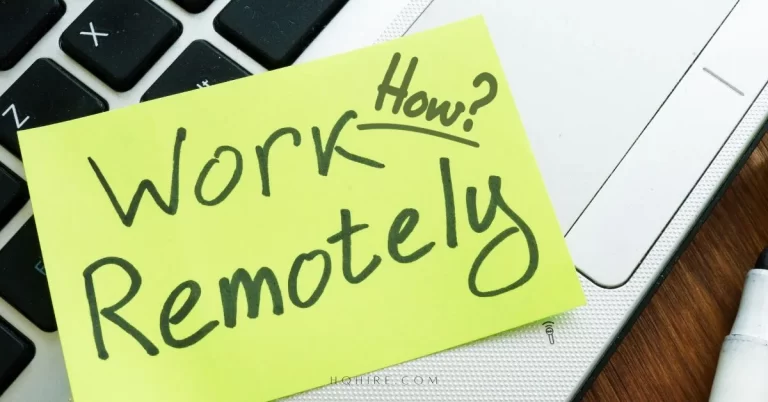Skip-level meetings can bridge the gap between different tiers in an organization, fostering transparency and trust across hierarchical levels.
These opportunistic dialogues are designed to enhance open communication, align on goals, and get a clearer picture of organizational health and employee sentiment.
Communication in these meeting goes both ways:
- Employee to senior leadership team (bosses’ boss)
- Senior leadership team to employees
KEY TAKEAWAYS
- Skip-level meetings promote open communication and trust between different organizational levels.
- Strategic questioning in these meetings can provide clarity and alignment on company objectives.
- These discussions offer a platform for leaders and employees to share feedback and foster mutual understanding.
What is a Skip-Level Meeting?

Skip-level meeting are meetings focus on letting you connect directly with senior leadership team who are one or more levels above your immediate supervisor.
Designed to foster open communication channels, skip-level meetings empower you with a platform to discuss concerns, provide feedback, and share ideas directly with higher management.
During a skip-level meeting, hierarchies are temporarily flattened, allowing for a genuine exchange of insights between different layers of the organization bridging gaps in hierarchical structures.
Questions to Ask Your Bosses’ Boss During Skip-Level Meeting as an Employee
Preparing questions in advance for your skip-level meeting can help you better understand the company’s direction and how your role aligns with its objectives.
It’s your opportunity to gain insight and foster connections with higher organizational levels.
Company Strategy Related Questions to Ask
- How do you see the company’s current strategy evolving over the next year? (Your understanding of the company strategy ensures your projects contribute effectively to overarching goals.)
- In light of our vision, what are the most critical objectives for our department? (Knowing these objectives helps align your work to the company’s strategic direction.)
Alignment Related Questions to Ask
- Can you explain how my department’s goals align with the company’s priorities? (This question indicates your desire to understand and contribute meaningfully to the big picture.)
- What are the key performance indicators for our department from your perspective? (Gaining insight into these indicators can guide you on how to focus your efforts.)
Feedback Related Questions to Ask
- What improvements would you like to see within our team or processes? (Understanding desired improvements can help you identify areas to showcase your strengths.)
- Could you provide an example of when manager feedback significantly influenced a project’s direction? (This question helps you appreciate the value and impact of constructive feedback.)
Career Development Related Questions to Ask
- What skills are you looking for in leaders at this company? (Knowing these skills can steer your personal development plan toward those leadership qualities.)
- Are there opportunities for advancement or coaching in areas critical to the company’s future? (Asking this shows your initiative to grow and make substantial contributions to the organization.)
Dos and Don’t For Employees During a Skip-Level Meeting
| Dos | Don’ts |
|---|---|
| Be prepared with constructive feedback | Don’t hesitate to speak up if you have concerns or ideas |
| Listen actively to management’s insights | Don’t monopolize the conversation or dominate the discussion |
| Respect the agenda and stay on topic | Don’t gossip or speak negatively about colleagues |
| Offer solutions or suggestions for improvement | Don’t complain without offering constructive solutions |
| Be respectful and professional in demeanor | Don’t make demands or ultimatums |
| Provide honest and respectful feedback | Don’t engage in confrontational or disrespectful behavior |
| Use the opportunity to voice concerns or questions | Don’t disclose confidential or sensitive information |
| Follow up on any action items or commitments | Don’t expect immediate solutions or changes |
Questions to Ask Employees by Boss and Managers During Skip-Level Meeting

In skip-level meetings, it’s crucial for you, the leader, to ask questions that not only uncover valuable insights but also foster a sense of trust and openness.
Questions to Build Trust and Rapport At The Start of The Meeting
- How are you feeling today? (This shows you care about them as individuals.)
- What’s something personal you’re proud of recently? (Sharing achievements can make them feel comfortable and valued.)
Questions to Get Manager’s Feedbacks From Employee
- Can you share your thoughts on your manager’s leadership style? (This could highlight areas of improvement or strengths.)
- What support from your manager has helped you the most? (Recognition of support encourages its continuation.)
Questions to Get Team’s Feedbacks From Employee
- How do you feel about the team’s communication and collaboration? (This gauges effectiveness in team meetings and everyday work.)
- What could improve the team’s productivity and engagement? (Identifies practical steps towards better team dynamics.)
Questions to Gain Insights on Employee Satisfaction From Employee
- What do you enjoy most about your work here? (Insights into morale and company culture.)
- What are your main concerns in your current role? (A direct way to address and alleviate issues impacting satisfaction.)
Questions to Understand Career Goals From Employee
- Where do you see yourself in the next few years? (Aligns personal aspirations with company’s growth.)
- What professional development opportunities are you looking for? (Shows investment in their career and talent.)
Questions to Understand Employee’s Perspective on Company’s Growth
- How do you feel your work contributes to the company’s mission? (Encourages alignment and understanding of the impact of their role.)
- What are your opinions on our recent changes or initiatives? (Gathers direct report’s honest perspective, informing future decisions.)
Dos and Don’t For Boss and Managers During a Skip Level Meeting
| Dos | Don’ts |
|---|---|
| Encourage open dialogue and feedback | Don’t dominate the conversation as a leader |
| Actively listen to employees’ concerns | Don’t dismiss or invalidate employees’ opinions |
| Provide clarity on company goals and direction | Don’t divulge sensitive or confidential information |
| Acknowledge employee contributions | Don’t make promises you can’t keep |
| Seek suggestions for improvement | Don’t use the meeting as a platform for personal agendas |
| Follow up on action items promptly | Don’t interrupt or cut off employees mid-sentence |
| Foster a positive and inclusive atmosphere | Don’t play favorites or show bias towards certain individuals |
| Respect employees’ time and input | Don’t let the meeting veer off-topic or become unproductive |
Why Should Your Participate in Skip Level Meeting?
By participating in skip-level meeting, you’ll gain insight into strategic visions at higher levels of leadership.
- For employees, it helps ensure that all voices are heard, including yours, which can be instrumental in strategic change initiatives.
- For senior leaders, it helps to benefit from unfiltered information from the ground up, which can inform their decisions.
Why Asking The Right Questions During a Skip Level Meeting is Important?

By asking targeted, strategic questions, you can unlock insights that are pivotal to your professional growth and the organization’s progress.
These exchanges allow leaders to obtain candid feedback, while employees can express concerns and ideas that might otherwise remain unheard.
Whether it’s gaining clarity on company vision or seeking advice on leadership, the value lies in creating an avenue for meaningful exchange at every organizational level.
How Should You Approach Skip-Level Meeting?
Approach the meeting with confidence and professionalism, for it’s a chance to make an impact.
As a preparatory measure, think carefully about the questions to pose and the feedback to provide.
Your thoughtful questions can inspire confidence and demonstrate your professionalism. They also reinforce that you are friendly and approachable, setting the foundation for a productive and motivational dialogue.
After all, it’s not just about getting your point across, but also about understanding the broader organizational goals and how you fit within them.






